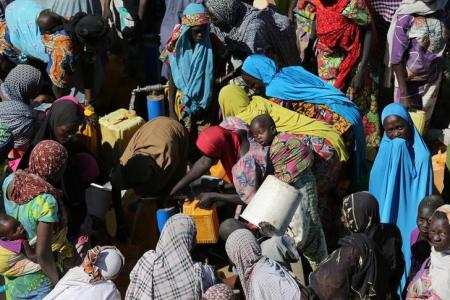
By Tom Gardner
ADDIS ABABA (Thomson Reuters Foundation) – As many as 3.5 million people in Africa were uprooted from their homes in 2015 due to conflict and natural disasters and left stranded in their own country, with many governments overlooking this growing problem, according to a report released on Friday.
Figures from the Internal Displacement Monitoring Centre (IDMC) showed an average of about 9,500 people fled their homes daily last year, bringing the total number of Africans displaced internally to 12.4 million, with the number set to rise in 2016.
The worst affected country was Nigeria, with as many as 736,000 fleeing their homes in 2015 as a result of violence associated with the Boko Haram militant Islamist insurgency.
The report calculates the number of internally displaced people (IDPs) is double the number of the continent’s refugees, estimated by the United Nations to have reached 5.4 million in 2015, highlighting the scale of Africa’s comparatively overlooked “internal displacement crisis”.
While refugees are the responsibility of the international community, people displaced within their own country are the responsibility of national governments.
“Many of these governments are not even aware of the scale of the problem within their own borders,” said Alexandra Bilak, IDMC director told the Thomson Reuters Foundation in an interview.
“They need to take up their responsibilities and actually keep track of these people.”
ONGOING CRISES
The figures for the first half of 2016 are likely to be at least as high with ongoing conflicts in countries like South Sudan, Democratic Republic of Congo (DRC) and Nigeria, Bilak said.
The report’s publication marks the anniversary of the Kampala Convention, Africa’s landmark commitment to preventing displacement and protecting the rights of IDPs, signed in 2009 and now ratified by 25 countries.
It argues better data is needed, especially on people driven from their homes by slow-onset crises such as a drought, and this is crucial if governments are to meet their commitments.
“Reliable data on population movements is vital to ensure a timely and well targeted operational and policy response,” the report said.
The IDMC hoped the report would be a reminder that while the continent’s refugee crisis has attracted international attention in recent years, the problem of huge numbers of Africans uprooted from their homes but temporarily settled in their own countries is not new.
“The same people remain on our books, year in, year out. The numbers are not going down,” said Bilak.
The report draws attention to “off-the-radar” displacement in countries like Ethiopia and Malawi, which, while relatively stable, suffer slow-moving environmental challenges such as drought that are “blind spots” for policymakers.
A third of African countries are prone to drought, and most are increasingly vulnerable as result of climate change.
It also highlights the role of southern Africa’s worst agricultural drought in 35 years – and resulting severe food shortages – in driving people from their homes in 2015.
The report also emphasised the need for African governments to recognise the role of development projects in causing the sort of “off-the-radar” displacement with people evicted from slums to make way for infrastucture.
All too often “the impact of development projects and business activities on the people they force from their homes and livelihoods is not visible to policymakers,” the report said.
(Reporting by Tom Gardner, Editing by Belinda Goldsmith; Please credit the Thomson Reuters Foundation, the charitable arm of Thomson Reuters, that covers humanitarian news, women’s rights, trafficking, property rights and climate change. Visit news.trust.org)
THE ROTTEN FISH: CAN OF WORMS OPENED OF APC & TINUBU'S GOVERNMENT OVER NIGERIA'S ECONOMIC DOWNTURN
WATCH THE CRITICAL ANALYSIS AND KNOW THE RESPONSIBLE PARTIES TO BLAME FOR NIGERIA'S ECONOMIC CHALLENGES, WHILE CITIZENS ENDURE SEVERE HARDSHIPS.Watch this episode of ISSUES IN THE NEWS on 9News Nigeria featuring Peter Obi's Special Adviser, Dr Katch Ononuju, 9News Nigeria Publisher, Obinna Ejianya and Tinubu Support Group Leader, McHezekiah Eherechi
The economic crisis and hardship in Nigeria are parts of the discussion.
Watch, leave your comments, and share to create more awareness on this issue.
#9NewsNigeria #Nigeria #issuesInTheNews #politics #tinubu THE ROTTEN FISH: CAN OF WORMS OPENED ...
DON'T FORGET TO SUBSCRIBE AND LEAVE YOUR COMMENTS FOR SUBSEQUENT UPDATES
#9newsnigeria #economia #economy #nigeria #government @9newsng
www.9newsng.com
